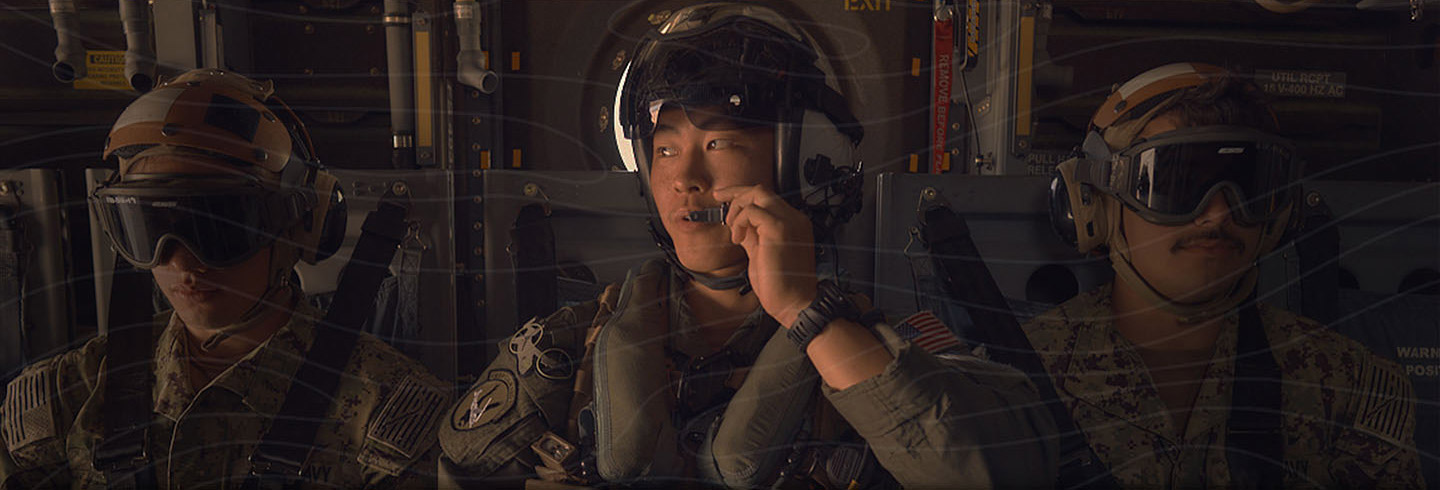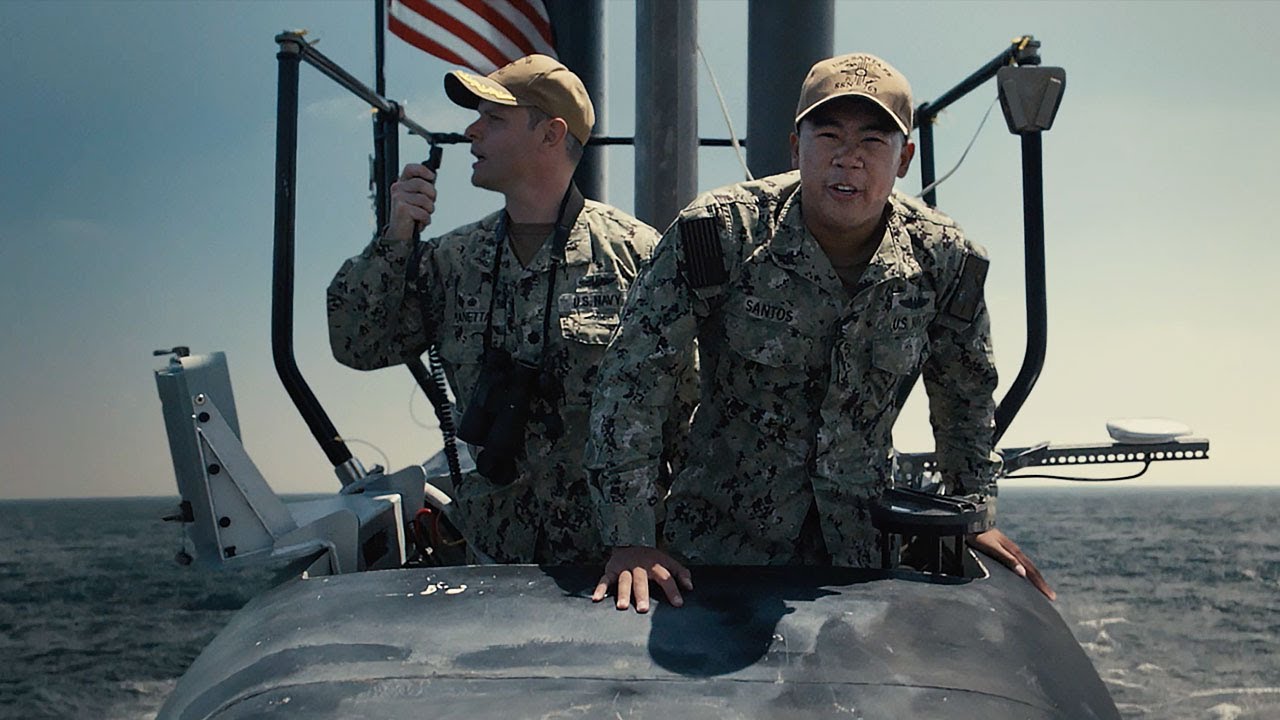Navy Career Quiz
Discover what the Navy has to offer. Whether you want to gain valuable STEM skills, hone your creative talents, or push your physical and mental limits, the Navy has the challenge for you. Take the quiz and discover your potential.

As an IP, you are among those who plan, acquire, secure, operate and maintain the Naval network and the systems that support Navy operations and business processes. This role may include:
Information Professionals serve in challenging roles of increasing scope and responsibility both afloat and ashore. This could include:
Those pursuing an Information Professional Officer position are required to attend Officer Candidate School (OCS) in Newport, RI. Upon completion, they typically attend a five-week IP Basic Course of instruction in Pensacola, FL, before or during their initial assignment.
IPs must complete specific qualifications as part of their training during Fleet tours and are expected to pursue advanced education opportunities. Promotion opportunities are regularly available but competitive and based on performance. It’s also important to note that specialized training received and work experience gained in the course of service can lead to valuable credentialing and occupational opportunities in related fields.
,Beyond professional credentials and certifications, Information Professionals can advance their education by:
Postgraduate education is important to the success of the Information Professional. Most IPs will complete a master’s degree in C4I, space, information systems, computer science or modeling and simulation.
There’s also potential to pursue a graduate certificate, DoD certifications, federal executive fellowships and information assurance scholarships and internships.
,A four-year degree is required to work as an Information Professional. Candidates seeking an Officer position in this community must have a bachelor’s degree from a regionally accredited institution in a technical field, preferably in one of following fields: Information Systems, Electrical Engineering, Computer Engineering, Information Operations, Computer Science, Systems Engineering or General Engineering.
All candidates must also be: U.S. citizens, willing to serve worldwide, eligible for a Top Secret/Sensitive Compartmented Information (SCI) security clearance, and qualified for sea duty.
General qualifications may vary depending upon whether you’re currently serving, whether you’ve served before or whether you’ve never served before.
As an IP, you are among those who plan, acquire, secure, operate and maintain the Naval network and the systems that support Navy operations and business processes. This role may include:
A four-year degree is required to work as an Information Professional. Candidates seeking an Officer position in this community must have a bachelor’s degree from a regionally accredited institution in a technical field, preferably in one of following fields: Information Systems, Electrical Engineering, Computer Engineering, Information Operations, Computer Science, Systems Engineering or General Engineering.
All candidates must also be: U.S. citizens, willing to serve worldwide, eligible for a Top Secret/Sensitive Compartmented Information (SCI) security clearance, and qualified for sea duty.
General qualifications may vary depending upon whether you’re currently serving, whether you’ve served before or whether you’ve never served before.
,A four-year degree is required to work as an Information Professional. Candidates seeking an Officer position in this community must have a bachelor’s degree from a regionally accredited institution in a technical field, preferably in one of following fields: Information Systems, Electrical Engineering, Computer Engineering, Information Operations, Computer Science, Systems Engineering or General Engineering.
All candidates must also be: U.S. citizens, willing to serve worldwide, eligible for a Top Secret/Sensitive Compartmented Information (SCI) security clearance, and qualified for sea duty.
General qualifications may vary depending upon whether you’re currently serving, whether you’ve served before or whether you’ve never served before.
,A four-year degree is required to work as an Information Professional. Candidates seeking an Officer position in this community must have a bachelor’s degree from a regionally accredited institution in a technical field, preferably in one of following fields: Information Systems, Electrical Engineering, Computer Engineering, Information Operations, Computer Science, Systems Engineering or General Engineering.
All candidates must also be: U.S. citizens, willing to serve worldwide, eligible for a Top Secret/Sensitive Compartmented Information (SCI) security clearance, and qualified for sea duty.
General qualifications may vary depending upon whether you’re currently serving, whether you’ve served before or whether you’ve never served before.
,A four-year degree is required to work as an Information Professional. Candidates seeking an Officer position in this community must have a bachelor’s degree from a regionally accredited institution in a technical field, preferably in one of following fields: Information Systems, Electrical Engineering, Computer Engineering, Information Operations, Computer Science, Systems Engineering or General Engineering.
All candidates must also be: U.S. citizens, willing to serve worldwide, eligible for a Top Secret/Sensitive Compartmented Information (SCI) security clearance, and qualified for sea duty.
General qualifications may vary depending upon whether you’re currently serving, whether you’ve served before or whether you’ve never served before.
As an Intelligence Officer, you will take on a wide variety of assignments, each one essential in its related mission or objective. This role may include:
Depending on interests, background and performance, Intelligence Officers have opportunities to serve worldwide:
Those pursuing an Intelligence Officer position are required to attend Officer Candidate School (OCS) in Newport, RI. Upon completion, they attend a five-month basic course of instruction at the Navy and Marine Corps Intelligence Training Center in Dam Neck, VA, where they receive training in: electronic, anti-submarine, anti-surface, anti-air, amphibious and strike warfare; counterintelligence; strategic intelligence; air defense analysis; and combat mission planning.
From there, INTEL Officers embark on a 30-month operational fleet tour. This is typically an assignment with an aviation squadron, with an air wing staff or onboard an aircraft carrier or amphibious command ship. Promotion opportunities are regularly available but competitive and based on performance. It’s also important to note that specialized training received and work experience gained in the course of service can lead to valuable credentialing and occupational opportunities in related fields.
,Beyond professional credentials and certifications, Intelligence Officers can advance their education by:
A four-year degree from a regionally accredited institution is required to work as an Intelligence Officer. It is preferred that the degree focuses on areas of study such as: international relations, political science, government, engineering, physical science, natural science, computer science, or other academic fields related to intelligence.
All candidates must also be: US citizens; willing to serve worldwide; and eligible for a special intelligence security clearance.
General qualifications may vary depending upon whether you’re currently serving, whether you’ve served before or whether you’ve never served before.
As an Intelligence Officer, you will take on a wide variety of assignments, each one essential in its related mission or objective. This role may include:
A four-year degree from a regionally accredited institution is required to work as an Intelligence Officer. It is preferred that the degree focuses on areas of study such as: international relations, political science, government, engineering, physical science, natural science, computer science, or other academic fields related to intelligence.
All candidates must also be: US citizens; willing to serve worldwide; and eligible for a special intelligence security clearance.
General qualifications may vary depending upon whether you’re currently serving, whether you’ve served before or whether you’ve never served before.
,A four-year degree from a regionally accredited institution is required to work as an Intelligence Officer. It is preferred that the degree focuses on areas of study such as: international relations, political science, government, engineering, physical science, natural science, computer science, or other academic fields related to intelligence.
All candidates must also be: US citizens; willing to serve worldwide; and eligible for a special intelligence security clearance.
General qualifications may vary depending upon whether you’re currently serving, whether you’ve served before or whether you’ve never served before.
,A four-year degree from a regionally accredited institution is required to work as an Intelligence Officer. It is preferred that the degree focuses on areas of study such as: international relations, political science, government, engineering, physical science, natural science, computer science, or other academic fields related to intelligence.
All candidates must also be: US citizens; willing to serve worldwide; and eligible for a special intelligence security clearance.
General qualifications may vary depending upon whether you’re currently serving, whether you’ve served before or whether you’ve never served before.
,A four-year degree from a regionally accredited institution is required to work as an Intelligence Officer. It is preferred that the degree focuses on areas of study such as: international relations, political science, government, engineering, physical science, natural science, computer science, or other academic fields related to intelligence.
All candidates must also be: US citizens; willing to serve worldwide; and eligible for a special intelligence security clearance.
General qualifications may vary depending upon whether you’re currently serving, whether you’ve served before or whether you’ve never served before.
Surface Warfare Officers are involved in virtually every aspect of Navy missions. As a SWO, you may be in charge of any number of shipboard operations and activities while at sea, working with or within any of these specialized forces:
Aircraft Carrier Forces: Provide and coordinate air, submarine and surface ship defense for aircraft carriers
Cruiser-Destroyer Forces: Provide ship attack and defensive measures with a wide array of missile and fire power capabilities, providing anti-air, -submarine and -surface warfare support
Amphibious Forces: Embark and transport vehicles, equipment and personnel for amphibious assault operations
Combat-Logistics Forces: Provide combatant ships with fuel, ammunition, food and supplies, and provide repair, maintenance and rescue capabilities through Fleet Support Ships
Mine Warfare Forces: Detect, identify and neutralize threats from hostile use of maritime mines
You may also be interested in becoming a Surface Warfare Officer within the prestigious Navy Nuclear community, where you will have the opportunity to work on some of the world’s most powerful nuclear-powered submarines and aircraft carriers.
,As a Surface Warfare Officer, you will work at sea and on shore, in a variety of environments. Sea duty could place you aboard ships within the fleet. Shore duty may involve a tour of duty at the Pentagon; a student assignment at the Naval Postgraduate School in Monterey, CA; or command and management positions at shore bases and stations around the world.
,Unless they have already been commissioned through the Naval Academy or ROTC, those pursuing a Surface Warfare Officer position are required to attend Officer Candidate School (OCS) in Newport, RI. Newly commissioned SWOs can expect an advanced training process that includes comprehensive training at sea and ashore.
Newly commissioned Surface Warfare Officers will be assigned to a surface ship, leading a team of Sailors responsible for a component of the ship – anything from electronics to weapons to engineering systems. In this setting, Officers are working toward full Surface Warfare qualification.
After completing these initial sea tours, Surface Warfare Officers may be selected to serve on high-level staffs, commands or strategic projects, or they may be selected to work in recruitment. Promotion opportunities are regularly available but competitive and based on performance. It’s also important to note that specialized training received and work experience gained in the course of service can lead to valuable credentialing and occupational opportunities in related fields. The ultimate goal for many: to one day command their own ship.
,Beyond professional credentials and certifications, Surface Warfare Officers can advance their education by:
A four-year degree from an accredited U.S. college or university is required to become a Surface Warfare Officer. There are different ways to become a SWO. If you're a high school student or an undergraduate, you can enter through the Naval Reserve Officers Training Corps (NROTC) or through the U.S. Naval Academy. Those already having a degree attend Officer Candidate School (OCS), a 12-week Navy school in Newport, RI.
To be an eligible candidate, you must:
General qualifications may vary depending upon whether you’re currently serving, whether you’ve served before or whether you’ve never served before.
Surface Warfare Officers are involved in virtually every aspect of Navy missions. As a SWO, you may be in charge of any number of shipboard operations and activities while at sea, working with or within any of these specialized forces:
Aircraft Carrier Forces: Provide and coordinate air, submarine and surface ship defense for aircraft carriers
Cruiser-Destroyer Forces: Provide ship attack and defensive measures with a wide array of missile and fire power capabilities, providing anti-air, -submarine and -surface warfare support
Amphibious Forces: Embark and transport vehicles, equipment and personnel for amphibious assault operations
Combat-Logistics Forces: Provide combatant ships with fuel, ammunition, food and supplies, and provide repair, maintenance and rescue capabilities through Fleet Support Ships
Mine Warfare Forces: Detect, identify and neutralize threats from hostile use of maritime mines
You may also be interested in becoming a Surface Warfare Officer within the prestigious Navy Nuclear community, where you will have the opportunity to work on some of the world’s most powerful nuclear-powered submarines and aircraft carriers.
,A four-year degree from an accredited U.S. college or university is required to become a Surface Warfare Officer. There are different ways to become a SWO. If you're a high school student or an undergraduate, you can enter through the Naval Reserve Officers Training Corps (NROTC) or through the U.S. Naval Academy. Those already having a degree attend Officer Candidate School (OCS), a 12-week Navy school in Newport, RI.
To be an eligible candidate, you must:
General qualifications may vary depending upon whether you’re currently serving, whether you’ve served before or whether you’ve never served before.
,A four-year degree from an accredited U.S. college or university is required to become a Surface Warfare Officer. There are different ways to become a SWO. If you're a high school student or an undergraduate, you can enter through the Naval Reserve Officers Training Corps (NROTC) or through the U.S. Naval Academy. Those already having a degree attend Officer Candidate School (OCS), a 12-week Navy school in Newport, RI.
To be an eligible candidate, you must:
General qualifications may vary depending upon whether you’re currently serving, whether you’ve served before or whether you’ve never served before.
,A four-year degree from an accredited U.S. college or university is required to become a Surface Warfare Officer. There are different ways to become a SWO. If you're a high school student or an undergraduate, you can enter through the Naval Reserve Officers Training Corps (NROTC) or through the U.S. Naval Academy. Those already having a degree attend Officer Candidate School (OCS), a 12-week Navy school in Newport, RI.
To be an eligible candidate, you must:
General qualifications may vary depending upon whether you’re currently serving, whether you’ve served before or whether you’ve never served before.
,A four-year degree from an accredited U.S. college or university is required to become a Surface Warfare Officer. There are different ways to become a SWO. If you're a high school student or an undergraduate, you can enter through the Naval Reserve Officers Training Corps (NROTC) or through the U.S. Naval Academy. Those already having a degree attend Officer Candidate School (OCS), a 12-week Navy school in Newport, RI.
To be an eligible candidate, you must:
General qualifications may vary depending upon whether you’re currently serving, whether you’ve served before or whether you’ve never served before.
Engineering Duty Officers uphold the Navy’s priorities for on-time delivery of ships and submarines, improving the warfighting capability of ships and subs and maintaining a robust cybersecurity network. They are the force behind the fleet who are responsible for:
Your work as an Engineering Duty Officer is highly valued and can take you virtually anywhere. Most EDOs are stationed at shore commands in Washington, DC, Norfolk, VA or San Diego, CA—however, there are opportunities for exciting sea tours around the world in Australia, Canada, Italy, Japan, Singapore, Bahrain and Saudi Arabia.
,All Engineering Duty Officers have a warfighting foundation, are technically skilled and are committed to a continuous business education. Engineering Duty Officers must complete professional training and gain experience through:
This is an officer career and not available for enlisted Sailors in the Navy.
,All Engineering Duty Officers are required to obtain a Master’s degree in a technical curriculum from the Naval Postgraduate School or Massachusetts Institute of Technology.
Curriculum Listing:
Curriculum Listing:
A four-year degree from an accredited U.S. college or university is required to become an Engineering Duty Officer. There are different routes to becoming an EDO. If you’re a high school student or an undergraduate, you can enter through the Naval Reserve Officers Training Corps (NROTC) or through the U.S. Naval Academy. Those already possessing a degree attend Officer Candidate School (OCS), a 12-week Navy school in Newport, RI.
The Engineering Duty Officer community does not have direct accessions through the USNA/NROTC commissioning sources. ED accessions are warfare-qualified officers who are strong performers and academically qualified to pursue a technical Master’s Degree.
General qualifications may vary depending upon whether you’re currently serving, whether you’ve served before or whether you’ve never served before.
Engineering Duty Officers uphold the Navy’s priorities for on-time delivery of ships and submarines, improving the warfighting capability of ships and subs and maintaining a robust cybersecurity network. They are the force behind the fleet who are responsible for:
A four-year degree from an accredited U.S. college or university is required to become an Engineering Duty Officer. There are different routes to becoming an EDO. If you’re a high school student or an undergraduate, you can enter through the Naval Reserve Officers Training Corps (NROTC) or through the U.S. Naval Academy. Those already possessing a degree attend Officer Candidate School (OCS), a 12-week Navy school in Newport, RI.
The Engineering Duty Officer community does not have direct accessions through the USNA/NROTC commissioning sources. ED accessions are warfare-qualified officers who are strong performers and academically qualified to pursue a technical Master’s Degree.
General qualifications may vary depending upon whether you’re currently serving, whether you’ve served before or whether you’ve never served before.
,A four-year degree from an accredited U.S. college or university is required to become an Engineering Duty Officer. There are different routes to becoming an EDO. If you’re a high school student or an undergraduate, you can enter through the Naval Reserve Officers Training Corps (NROTC) or through the U.S. Naval Academy. Those already possessing a degree attend Officer Candidate School (OCS), a 12-week Navy school in Newport, RI.
The Engineering Duty Officer community does not have direct accessions through the USNA/NROTC commissioning sources. ED accessions are warfare-qualified officers who are strong performers and academically qualified to pursue a technical Master’s Degree.
General qualifications may vary depending upon whether you’re currently serving, whether you’ve served before or whether you’ve never served before.
,A four-year degree from an accredited U.S. college or university is required to become an Engineering Duty Officer. There are different routes to becoming an EDO. If you’re a high school student or an undergraduate, you can enter through the Naval Reserve Officers Training Corps (NROTC) or through the U.S. Naval Academy. Those already possessing a degree attend Officer Candidate School (OCS), a 12-week Navy school in Newport, RI.
The Engineering Duty Officer community does not have direct accessions through the USNA/NROTC commissioning sources. ED accessions are warfare-qualified officers who are strong performers and academically qualified to pursue a technical Master’s Degree.
General qualifications may vary depending upon whether you’re currently serving, whether you’ve served before or whether you’ve never served before.
,A four-year degree from an accredited U.S. college or university is required to become an Engineering Duty Officer. There are different routes to becoming an EDO. If you’re a high school student or an undergraduate, you can enter through the Naval Reserve Officers Training Corps (NROTC) or through the U.S. Naval Academy. Those already possessing a degree attend Officer Candidate School (OCS), a 12-week Navy school in Newport, RI.
The Engineering Duty Officer community does not have direct accessions through the USNA/NROTC commissioning sources. ED accessions are warfare-qualified officers who are strong performers and academically qualified to pursue a technical Master’s Degree.
General qualifications may vary depending upon whether you’re currently serving, whether you’ve served before or whether you’ve never served before.
Whether operating in the air, at sea or underwater, Navy equipment, people and decision-making all rely on the technical and tactical advice of Navy Meteorology and Oceanography (METOC) Officers. They apply expertise in all facets of oceanography, meteorology, hydrography, and precise time and astronomy as they:
Navy Meteorologists and Oceanographers may serve in a wide variety of settings around the world, from serving aboard aircraft carriers or amphibious ships, to conducting research at the Naval Observatory or Naval Research Labs. You will also have the opportunity to further your education at Naval Postgraduate School.
,Those pursuing a Meteorology and Oceanography Officer position are required to attend Officer Candidate School (OCS) in Newport, RI. Upon completion, they typically attend a 5-week Basic Oceanography Accession Training (BOAT) in Gulfport, MS. They also receive specialized training that includes methods of analyzing weather conditions, identification of common weather patterns, and techniques and procedures of forcecasting.
From there, METOC Officers embark on a career path that usually progresses from an operational tour (a non-oceanography role on a ship or with a deployable unit) to a Naval Oceanography tour (within a warfighting directorate or production center) followed by an education tour (which involves receiving formal education in a preferred discipline).
After that, there are opportunities to serve on aircraft carriers, with Strike Group Staff, and in roles more specialized to one’s preferred discipline and with increasing leadership responsibilities. Promotion opportunities are regularly available but competitive and based on performance. It’s also important to note that specialized training received and work experience gained in the course of service can lead to valuable credentialing and occupational opportunities in related fields.
,Beyond professional credentials and certifications, Meteorology and Oceanography Officers can advance their education by:
Oceanography and Meteorology Officers eventually earn a dual master's degree in meteorology and physical oceanography at Naval Postgraduate School (NPS) in Monterey, CA. There are opportunities to receive informal business training in areas such as budget/finance, manpower, and research and development. And beyond that, you could potentially earn a doctoral degree while being paid full-time as a Navy Officer.
,A four-year degree is required to work as a Meteorology and Oceanography Officer. Candidates seeking an Officer position in this community must have a bachelor’s degree from a regionally accredited institution in a technical field, preferably in areas of study such as physics, physics-based oceanography, meteorology, hydrography, earth science, or engineering.
All candidates must also be U.S. citizens, eligible for a secret security clearance and qualified for sea duty.
General qualifications may vary depending upon whether you’re currently serving, whether you’ve served before or whether you’ve never served before.
Whether operating in the air, at sea or underwater, Navy equipment, people and decision-making all rely on the technical and tactical advice of Navy Meteorology and Oceanography (METOC) Officers. They apply expertise in all facets of oceanography, meteorology, hydrography, and precise time and astronomy as they:
A four-year degree is required to work as a Meteorology and Oceanography Officer. Candidates seeking an Officer position in this community must have a bachelor’s degree from a regionally accredited institution in a technical field, preferably in areas of study such as physics, physics-based oceanography, meteorology, hydrography, earth science; or engineering.
All candidates must also be U.S. citizens, eligible for a secret security clearance and qualified for sea duty.
General qualifications may vary depending upon whether you’re currently serving, whether you’ve served before or whether you’ve never served before.
,A four-year degree is required to work as a Meteorology and Oceanography Officer. Candidates seeking an Officer position in this community must have a bachelor’s degree from a regionally accredited institution in a technical field, preferably in areas of study such as physics, physics-based oceanography, meteorology, hydrography, earth science; or engineering.
All candidates must also be U.S. citizens, eligible for a secret security clearance and qualified for sea duty.
General qualifications may vary depending upon whether you’re currently serving, whether you’ve served before or whether you’ve never served before.
,A four-year degree is required to work as a Meteorology and Oceanography Officer. Candidates seeking an Officer position in this community must have a bachelor’s degree from a regionally accredited institution in a technical field, preferably in areas of study such as physics, physics-based oceanography, meteorology, hydrography, earth science; or engineering.
All candidates must also be U.S. citizens, eligible for a secret security clearance and qualified for sea duty.
General qualifications may vary depending upon whether you’re currently serving, whether you’ve served before or whether you’ve never served before.
,A four-year degree is required to work as a Meteorology and Oceanography Officer. Candidates seeking an Officer position in this community must have a bachelor’s degree from a regionally accredited institution in a technical field, preferably in areas of study such as physics, physics-based oceanography, meteorology, hydrography, earth science; or engineering.
All candidates must also be U.S. citizens, eligible for a secret security clearance and qualified for sea duty.
General qualifications may vary depending upon whether you’re currently serving, whether you’ve served before or whether you’ve never served before.
Travel the world to capture military operations, develop high-profile media campaigns and tell the story of America’s Navy.

Navy Musicians perform at special events, celebrations, international parades and more.

Write news releases. Answer reporters' questions. Manage the public image of America’s Navy as a valued Public Affairs Officer.

Control congestion in the skies as an Air Traffic Controller.

Lead the flight deck as an Aircraft Handling Officer.

When you become an Aircrewman Helicopter, you become the eyes and ears of the cockpit.

Become our go-to personnel in the air as an Aircrewman Mechanical.

Detect and engage threats beneath the ocean’s surface as an Aircrewman Operator.

Hunt for lurking submarines from the air as a Tactical Romeo Helicopter Aircrewman.

Manage and direct aircraft launch operations on the flight deck.

Refuel aircraft on the flight deck and keep fuel flowing to all parts of the ship.

Launch and recover aircraft on the flight deck of an aircraft carrier.

Lead flight support teams as an Aviation Maintenance Duty Officer.

Manage your ship’s stock of missiles, mines and other ordnance.

Ready to lead the launch as a Catapult Officer Shooter?

Defend from the sea to the stratosphere as a Navy Fighter Pilot.

Hunt submarines, patrol the skies or supply carriers as a Fixed Wing Pilot.

Track subsurface contacts and perform rescue missions as a Helicopter Pilot.

Uncover threats in the depths of the sea as a Naval Aircrewman Avionics.

Lead flight missions to success as a Naval Flight Officer.

Keep the Navy’s complex aircraft and helicopters in top working order.

Provide meals that keep your fellow Sailors fueled for duty.

Support and assist fellow Sailors by helping guide their career journey.

Keep your ship stocked with the equipment it needs to succeed.

Advance your own career goals while you help fellow Sailors do the same.

Keep your shipmates happy by managing ship store, laundry and barber services.

Oversee logistics and ensure your ship is supplied with everything it needs.

Become an administrative pro by managing the Navy’s paperwork and records.

If you like to solve problems using your hands, you belong with the Builders.

Design and build city-size bases, airfields and harbor facilities.

Kickstart your career with hands-on electrical experience.

Get out of the auto shop and get hands-on mechanical experience.

Start your engineering career with real-world experience as a Navy Seabee.

Work with construction equipment from bulldozers to cranes and everything in between.

Weld metal a world away as a Navy Steelworker.

Keep critical utilities systems up and running no matter where you are in the world.

Maintain and repair the complex electronic systems aboard Navy aircraft.

Use electronic systems like radar to detect threats and make your ship virtually invisible.

Maintain the navigation systems that ensure your submarine reaches its destination.

Maintain the electronic systems controlling a submarine’s vast supply of firepower.

Ready, aim, fire. Maintain ship combat readiness as a Fire Controlman.

Keep vital computer networks up and running aboard ships and submarines.

Keep our comms running smoothly as an Interior Communications Electrician.

Assemble, maintain and repair nuclear-capable ballistic missiles as a Missile Technician.

Keep our Sailors out of harm's way and defend against emergencies as a Damage Controlman.

As a Master-at-Arms, you are the Navy police. Defend by serving and protecting our own.

Keep Navy aircraft at peak performance by maintaining electrical systems and components.

Maintain the engines of the Navy’s most powerful aircraft and helicopters.

Inspect and repair aviation equipment to ensure aircraft are always flight-ready.

Maintain aircraft equipment that sustains life at every altitude.

Perform ground support operations that keep Navy aircraft flying high.

Be the person Navy pilots rely on to keep emergency equipment in top shape.

Perform honored duties as a member of the Navy’s oldest rating.

Keep the power on and the lights running aboard aircraft carriers and ships.

Move the fleet forward as an expert in diesel engine systems.

Operate the electrical systems of powerful turbine engines on Navy warships.

Maintain the mechanical systems behind our powerful turbine engines.

Maintain your ship’s guns and missile launchers, and oversee all weapons on board.

Perform metal work and welding to repair hull breaches and broken equipment.

Repair tools and fabricate parts for machinery and equipment across the ship.

Maintain vital propulsion and auxiliary systems on every inch of the ship.

Maintain the systems that make life possible on a submarine.

Serve aboard a Minesweeper to detect and neutralize underwater explosives.

Secure our underwater missile silos aboard submarines as a Torpedoman’s Mate.

Hunt for signals to provide our teams intel as a Cryptologic Technician Collection.

Translate and interpret foreign comms as a Cryptologic Technician Interpretive.

Troubleshoot and maintain top-secret equipment as a Cryptologic Technician Maintenance.

Become an expert in radar signals as a Cryptologic Technician Technical.

Lead intel operations as a Cryptologic Warfare Officer.

Defend and attack in cyberspace as a Cyber Warfare Engineer.

Perform offensive and defensive cyber operations as a Cyber Warfare Technician.

Lead your team in maintaining and securing our networks as an Information Professional Officer.

Lead the charge on national intelligence security as an Intelligence Officer.

Gather intel and prepare important briefs as an Intelligence Specialist.

Execute mission-critical cyber operations as a Maritime Cyber Warfare Officer.

Gather critical intel around your ship as an Operations Specialist.

Navigate the open seas and keep our ships on track as a Quartermaster.

Track what lies beneath the waves on a surface ship or submarine as a Sonar Technician.

Emerge as a true leader by commanding the fleet, the crew and all vital systems aboard vital Navy vessels.

Raise the bar with a legal career in the Navy JAG Corps.

Kickstart your legal career with hands-on experience in the Navy.

Engineer ways for Naval Aviators to succeed in impossible environments.

Study the psychological effects of supersonic travel on aviators.

Treat hearing issues and conduct research to preserve auditory health for Sailors and Marines.

Provide therapy services to Sailors experiencing stressors uniquely related to service.

Cut your teeth in dentistry with a job that takes you around the world.

Become a disease expert for the Navy and make outbreaks a thing of the past.

Shape policy and practice in one of the world’s foremost global health care systems.

Help save lives by assisting in critical medical departments and procedures.

Save lives in the shadows.

Eliminate workplace safety hazards so Sailors can focus on the mission at hand.

Provide laboratory services that give Navy doctors and patients the answers they seek.

Give fallen Sailors the dignity and respect they deserve as a Navy Mortician.

Join the ranks of the toughest, most talented nurses you’ll ever meet.

Rehabilitate Sailors following illness or injury with cutting-edge devices and therapy.

Diagnose and treat vision problems to ensure service members maintain excellent eyesight.

Consult with patients, dispense medication and provide guidance to people in need.

Help Sailors recover from injuries so they can get back to work.

Save lives as a Navy Physician without all the hurdles of civilian medical practice.

Work alongside surgeons and supervising physicians to deliver the best health care.

Keep Navy Sailors on their feet by treating foot and ankle injuries.

Keep fellow Sailors safe from potential radiation exposure.

Improve the health of Sailors and people across the world through mindful nutrition.

Conduct research to protect our Sailors from biological, radiological and chemical threats.

Diagnose, treat and rehabilitate Sailors with training-related injuries.

Explore cognitive and physiological psychology to keep Sailors sound in mind and body.

Counsel active and retired members and their families during times of social, psychological or emotional need.

Be a spiritual guide and moral anchor, supporting servicemembers during their most joyful moments and during their most difficult ones.

Prepare devotional materials and organize faith-based events, while also serving as a resource for Navy Chaplains.

Serve as a meteorology and oceanography expert as an Aerographer’s Mate.

Design and build city-size bases, airfields and harbor facilities.

Power the world’s strongest Navy as an Electrician’s Mate Nuclear.

Power Navy ships as an Electronics Technician Nuclear.

Design, develop and deploy the Navy’s modern combat fleet.

Maintain safety in any environment as a Navy Entomologist.

Become the Navy’s nuclear reactor mechanic as a Machinist’s Mate Nuclear.

Study the sea the and the weather in environments around the world as a METOC Officer.

Conduct medical research and trace infectious diseases to defeat biological threats.

As a Naval Reactors Engineer, you can set the standard in nuclear reactor research.

If you’re a Nuclear Power School Instructor, you’re the top expert on classified nuclear technology.

Lead and oversee a team running one of the most dynamic nuclear power plants in the world.

Take charge of a nuclear reactor on an aircraft carrier as a Nuclear Surface Warfare Officer.

Lead every department on our nuclear-powered subs as a Submarine Officer.

Brave extreme conditions so others may live.

Master high-tech tools to eliminate explosive threats.

Save lives in the shadows.

Master the depths that others can’t reach.

Everyone wants to be a Frogman on Friday.

Deliver Special Operations assets where they’re needed.

Talk to a Navy recruiter. From STEM careers to Navy life, get the answers to your burning questions.
Chat with a Navy expert about top STEM careers, unique scholarship opportunities, our culture of excellence, or any other burning questions you might have.
Closed on federal holidays.
Before you start a chat, please read our chatroom rules:
Don't see a chat button on this page? Try using a different internet browser. There is a known issue affecting some users from accessing the chat button. We are actively working to fix this issue.
Make sure you’re getting the latest updates and information about top STEM career opportunities, benefits, day-to-day life in the Navy and more. We will only use your information for our communications. You can also talk to a Navy recruiter.
* Required Field
You must be 13 years old or older to subscribe to Navy emails.

Discover what the Navy has to offer. Whether you want to gain valuable STEM skills, hone your creative talents, or push your physical and mental limits, the Navy has the challenge for you. Take the quiz and discover your potential.


Embark on covert missions, defuse bombs, dive deep in the sea and save lives in spec ops.

Provide best in-class care for Sailors and Marines committed to serving our country.

Use your skills in math and science to implement the latest technology into the fleet.
Interested in becoming part of Navy Special Operations? See if you have what it takes by testing yourself in the Physical Screening Test (PST). Check out the current leaderboard and see how you measure up against other candidates across the nation and find testing events in your area.

What will you accomplish that once felt impossible? Here you can push past your limits to fly faster than the speed of sound, serve with astronauts in the space program or work on the most powerful engines in the world. Want to see what you’re really made of? Keep in touch with us to find out.

Have a question or just want to learn more? We're here to help.



